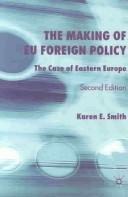| Listing 1 - 10 of 514 | << page >> |
Sort by
|
Book
ISBN: 1849467005 9781849467001 Year: 2015 Publisher: Oxford: Hart,
Abstract | Keywords | Export | Availability | Bookmark
 Loading...
Loading...Choose an application
- Reference Manager
- EndNote
- RefWorks (Direct export to RefWorks)

ISBN: 0333726057 Year: 1999 Publisher: Houndmills : Macmillan,
Abstract | Keywords | Export | Availability | Bookmark
 Loading...
Loading...Choose an application
- Reference Manager
- EndNote
- RefWorks (Direct export to RefWorks)
Book
ISBN: 9789291981434 Year: 2009 Publisher: Paris European Union institute for security studies
Abstract | Keywords | Export | Availability | Bookmark
 Loading...
Loading...Choose an application
- Reference Manager
- EndNote
- RefWorks (Direct export to RefWorks)
Book
ISBN: 9789072908407 Year: 2009 Publisher: Maastricht ECDPM
Abstract | Keywords | Export | Availability | Bookmark
 Loading...
Loading...Choose an application
- Reference Manager
- EndNote
- RefWorks (Direct export to RefWorks)
Book
ISBN: 9789291981489 9788439381150 Year: 2009 Publisher: Paris : European Union institute for security studies,
Abstract | Keywords | Export | Availability | Bookmark
 Loading...
Loading...Choose an application
- Reference Manager
- EndNote
- RefWorks (Direct export to RefWorks)
Book
ISBN: 9788073780753 Year: 2008 Publisher: Prague Matfyzpress
Abstract | Keywords | Export | Availability | Bookmark
 Loading...
Loading...Choose an application
- Reference Manager
- EndNote
- RefWorks (Direct export to RefWorks)
Book
ISBN: 9789038212654 Year: 2008 Volume: 20 Publisher: Gent Academia Press
Abstract | Keywords | Export | Availability | Bookmark
 Loading...
Loading...Choose an application
- Reference Manager
- EndNote
- RefWorks (Direct export to RefWorks)
Book
ISBN: 9789067043298 906704329X Year: 2010 Publisher: The Hague: Asser press,
Abstract | Keywords | Export | Availability | Bookmark
 Loading...
Loading...Choose an application
- Reference Manager
- EndNote
- RefWorks (Direct export to RefWorks)
Book
ISSN: 10177566 ISBN: 9291981052 9789291981052 Year: 2007 Volume: 96 Publisher: Paris Institute for Security Studies
Abstract | Keywords | Export | Availability | Bookmark
 Loading...
Loading...Choose an application
- Reference Manager
- EndNote
- RefWorks (Direct export to RefWorks)
Liberia, Sierra Leone, Guinea-Bissau, Guinea, Côte d'Ivoire … For many, these names conjure up political crises and violent conflicts. The five West African countries that constitute the Mano River Basin have attracted significant international and regional attention and preoccupation over the last fifteen years. Due to its history of colonial involvement in Africa, Europe shares a common past with these countries and has maintained a close partnership with them ever since their independence. Over the years, a series of agreements has established trade and development aid partnership links between the European Union and the Africa-Caribbean-Pacific (ACP) group of states. An increasing emphasis on political stability and on security was progressively introduced into the two last Lomé agreements and their successor, the Cotonou Agreement (2000). This peace and security dimension is also fully acknowledged in the EU's strategic partnership for Africa, which sets out the steps the EU will take by 2015 to support African efforts to build a peaceful future. The Mano River conflicts justified and gave a new urgency to these new efforts and the region remains the focus of considerable European political analysis and attention. This Chaillot Paper focuses on the recent trend in the EU towards a holistic understanding of development in Africa, whereby security, political stability and democracy are now considered essential elements in the recipe for economic development. A range of specific EU instruments for dealing with Africa has gradually emerged in this context. Against this background, the paper suggests some approaches for the improvement of the EU's current responses to West Africa's fragile economic and political stability.
Book
ISSN: 10177566 ISBN: 9789291981106 9291981109 Year: 2007 Volume: 100 Publisher: Paris Institute for Security Studies
Abstract | Keywords | Export | Availability | Bookmark
 Loading...
Loading...Choose an application
- Reference Manager
- EndNote
- RefWorks (Direct export to RefWorks)
To a large extent, the world to come depends on us. Political communities can respond to warnings and visions regarding their futures and organise themselves in order to shape and ‘improve’ those futures. The European integration process is a good example of a change of historical direction, marking a watershed between a past marred by devastating wars and a present characterised by common institutions and rules. This Chaillot Paper suggests that the next frontier in the future’s improvement process is global governance. Global challenges and opportunities call for concerted action. Individual states, including major - both old and emerging - powers cannot tackle challenges and exploit opportunities on their own. Therefore, new global agreements are needed to shape the future with a view to ensuring peaceful coexistence and avoiding widespread conflict and destruction. This paper foresees that a global ‘constitutional moment’ may appear at the beginning of the 2010s. Numerous issues will have to be addressed at this juncture: UN Security Council reform, peace and institution building in the Middle East region, reinforcement of peacekeeping capabilities, fossil fuel consumption, climate change and the spectre of extreme poverty in Africa. The European Union and its member states are well placed to contribute to future efforts conducive to global governance. However, a significant European contribution will require a more cohesive EU foreign policy. At a time when the EU’s future role as a global player is being defined, European governments should bear in mind that more and more European citizens are demanding a firmer commitment to international principles and values.
| Listing 1 - 10 of 514 | << page >> |
Sort by
|

 Search
Search Feedback
Feedback About UniCat
About UniCat  Help
Help News
News